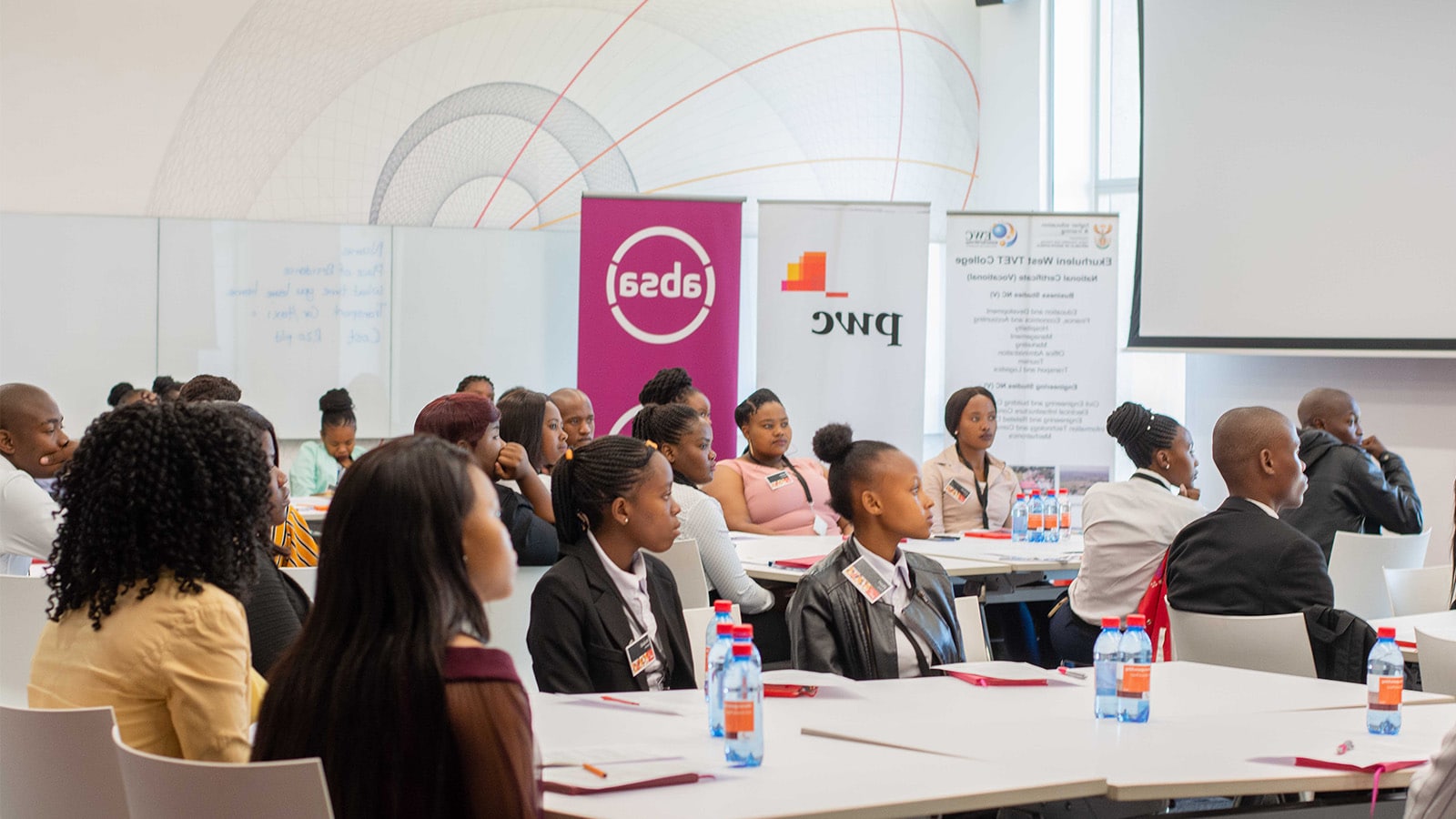
Living our societal purpose

Society demands us to stay true to our core values, to serve the public interest and to contribute towards the growth and development of our country and continent. At no time has this been more pertinent than in COVID-19 environment in which we find ourselves.
We don’t operate in isolation of the society and communities in which we work, and we recognise that many face significant challenges.
With our broad reach across the country, PwC South Africa is well positioned to make a real economic impact in all the communities in which we operate.
In line with our purpose and strategy, we’re committed to fulfilling our responsibility to play a key role in the digital upskilling of the communities that we serve. Our purpose articulates this commitment, and our people demonstrate it.
Corporate responsibility
Corporate responsibility initiatives can make a meaningful contribution to socio-economic development. We endeavour to honour our values — act with integrity, make a difference, care, work together and reimagine the possible — through our commitment to being a responsible corporate citizen and creating sustainable value in the communities in which we operate.
In the year to 30 June 2020, PwC South Africa invested R27.6 million (2019: R22.5 million) in social responsibility initiatives.


Our corporate responsibility programme aims to create measurable business and social value-enhancing outcomes in education, supporting entrepreneurship and building capacity in non-profit organisations.
Our strategic priorities include:
- Enhancing the socio-economic impact of our engagement initiatives.
- Improving the transparency and relevance of corporate responsibility reporting.
- Positioning PwC’s social brand, in line with our focus areas.
Education
Skilled for the Future
The Skilled for the Future initiative was established to enhance the functioning and educational performance of schools in rural and disadvantaged communities.

Working in partnership with the Department of Education, the initiative enhances access to quality education through the creation of effective learning environments. This is to empower students to be independent and critical thinkers, leaders and positive contributors to society, while receiving support from districts and school organisations, as well as taking part in community initiatives.
Sixty motivated, high-performing and high-potential learners from eight Gauteng Quintile 1 and 2 schools participated in the programme. They were matched with 60 PwC staff members chosen as mentors. The role of the mentors was to inspire the learners by creating a vision for their futures and motivating them to pursue further education.
To support the learning experience, PwC engaged other service providers to enrich the experience for learners and mentors. Gradesmatch, a career guidance service, assisted learners with career planning. Preventative care and counselling services were provided by ICAS. An external evaluator was also engaged to monitor progress and provide ongoing feedback on the programme.
The intervention resulted in a significant and measured growth in learners in terms of self and social awareness, as well as an upward shift in their confidence and in how they see themselves. The opportunities available to them also increased. For mentors, ‘giving back’ provided a greater sense of purpose and satisfaction and contributed to their own personal development.
Schools reported a renewed sense of hope among the learners. Even those who were not direct participants in the initiative were motivated to ‘look forward’. Local communities have been uplifted by learners sharing new skills with their peers, with some demonstrating an entrepreneurial spirit by sharing their new business skills with their peers and families.

TVET work-based experience programme
We worked with Absa to host a work-based experience programme for 100 TVET students at the PwC Waterfall office. One of the requirements for the diplomas and national certificates that the learners are studying towards, is for them to obtain a week’s worth of business experience before they graduate.
During the programme, learners were offered a blend of work-based experience and soft skills training to better equip them to make informed social, educational and vocational choices. The five-day programme involved onboarding and orientation, job shadowing as well as lunch meetings with partners.
Supporting entrepreneurship
During the year under review we continued to help small businesses grow by drawing on our expertise and those of external partners. Apart from contributing to economic transformation, this approach has enabled us to develop a potential pipeline of new business for the firm.
Stakeholders with expert knowledge of the SMME landscape and technical knowledge of the fields in which our enterprise development (ED) beneficiaries are involved, continued to deliver impactful interventions. Our relationships with other stakeholders, including business incubators and tertiary institutions, enabled us to further our programme’s strategic objectives.
Our focus on impacting developing entities, which themselves have a focus on the development of other small businesses, has paid off. Previous and existing ED beneficiaries partnered with us to ‘pay-it-forward’ by incubating and accelerating the development of other beneficiaries in the programme.
Projects and organisations we supported:
- MyCFO
We have supported MyCFO since its focus four years ago as a provider of outsourced finance function support to other SMMEs. MyCFO’s focus on the development of other SMMEs seeking growth has enabled the firm’s support to have a multiplier effect on the SMME sector. Find out more about MyCFO. - Business Skills for South Africa Foundation
This project began as a partnership between PwC and organised business in 1994 with the aim of transferring business skills and developing entrepreneurs. It continues to be relevant. The scope of the BSSA’s activities range from providing support to rural women to assisting large corporates to roll-out their skills and enterprise and supplier development programmes. BSSA has trained more than 74 000 people since its establishment. Find out more about BSSA. - Faranani Rural Women’s Training Programme
Launched in partnership with the BSSA in 2006, this programme continues to drive our agenda to develop women entrepreneurs and thereby empower rural communities. The continued success of the programme is in the well-attended sessions and positive feedback received. Find out more about the Faranani Rural Women’s Training Programme.
Building capacity for non-profit organisations
By providing skills and expertise pro bono, we support NGOs to better serve our communities by helping them report their results effectively and accurately. We perform audits and provide advisory services to a range of non-profit organisations through formal fee-waived engagements. We also lend our support to these organisations through the time that our partners and staff commit to board positions at non-profit organisations.
Payroll giving
Our payroll-giving initiative, Umbono, provides employees with an opportunity to initiate and support charitable projects through donations deducted directly from their salaries. Employees support diverse projects in our communities, with beneficiaries ranging from infants to the aged and from orphan assistance to wildlife conservation. The projects are entirely funded by staff donations and in certain instances supported with matched contributions by the firm.
In April 2020, we established a firmwide taskforce to drive PwC’s response to some of the issues raised by COVID-19, from a social perspective. This focused on connecting our people with those in need in four categories:
- Nutrition
- Animals in need
- Education
- Social and economic
Staff members nominated beneficiaries they were already supporting, and also collected monetary donations to support these and others. We also decided that we wanted to support all nine provinces with food packages and donations to support animals in need.
Within a month we were able to donate at least R10,000 per province each week, raising more than R360,000.
- Nutrition - Supporting mainly Feed SA and Food Forward, we supported allnine9 provinces, focusing on the hardest hit by COVID-19, namely Johannesburg, Cape Town and KwaZulu-Natal. We also supported staff-nominated beneficiaries in most provinces, including Ladles of Love, Muslim Welfare, Food4Life, Hennops Revival and more.
- Animals in need: Focusing mainly on the SPCAs, we supported all nine provinces, as well as staff-nominated beneficiaries, including the Sibuya Rhino Conservation in the Eastern Cape, the SA Conservation of Sea Birds in the Western Cape, and various animal shelters.
- Education - We supported Imagine Nation and Connect Community with food parcels and blankets for winter.
- Social and economic - We were able to support various organisations, including Hotel of Hope, MRA, and various small businesses who helped us make blankets for our blanket drive and care packages for our women’s drive.
- We also ran two specific initiatives, the Blanket Drive in July and Women’s Month in August. Both were very well supported and we were able to distribute over 800 blankets in Johannesburg, Cape Town and KwaZulu-Natal. We also supported eight organisations supporting women and youth at risk in the same three provinces.

Our economic contribution
In today’s fast-changing world, business faces challenges that extend beyond the bottom line. Professional services firms, like PwC, are required to demonstrate their economic contribution, communicate with a broad range of stakeholders, maximise the social impacts of investments and accurately report on their broader economic and social impacts. In such challenging economic times, where society demands more, it’s important to express these impacts in a measurable way.
PwC’s economic contribution to South Africa is estimated through its impact on national GDP, jobs, public finance and household income. Capital expenditure associated with our new building in Waterfall City and through the impact of our day-to-day operations has also been included.
Estimated economic impact
Contributing meaningful economic and fiscal value through our operations
The expenses incurred through our day-to-day operations and the people directly employed have a quantifiable beneficial impact on the South African economy. Our operations will continue to have a positive impact on the South African economy by delivering long-term economic benefits. Our firm recently developed a societal impact strategy, aimed at ensuring that we continue to support Government to deliver on the following Sustainable Development Goals (SDGs):

Contribution to public finance
PwC’s contribution to public finances forms a major part of our positive impact on the societies in which we operate. Our contribution to public finances is both direct and indirect, through a wide range of taxes, as well as non-taxation revenue mechanisms. We also contribute indirectly to government tax revenue and stimulate economic activity throughout our operations, incorporating a wide range of producers and suppliers.
Building public trust
PwC is proud of its long history of supporting the disclosure of meaningful and relevant tax information, through our ‘Building public trust’ initiative. We consider tax as fundamental to meeting the SDGs and it’s a key mechanism to effectively raise and allocate domestic resources for governments, to deliver essential public services and achieve broader development goals. We believe our purpose extends beyond creating value through profits: it includes our role in society, and the contribution we make to the economy and to the lives of employees, clients and the communities in which we work.
Responsible tax behaviour
We’re recognised for our leading role in the debate on tax reform, moral tax, and the reshaping of tax laws and regulations. We remain relevant by leveraging our expertise, investing in thought leadership, contributing to research and education and by leading the public debate. We see tax in a broader context, not only from a technical perspective, but also by focusing on tax governance, tax assurance and tax technology. We promote responsible, transparent tax behaviour and recognise the tax transparency initiatives of our clients.
Our Tax Code of Conduct
We’re opposed to tax evasion and the facilitation of tax evasion. In accordance with the PwC Tax Code of Conduct, it’s unacceptable for anyone providing services for or on behalf of PwC to evade tax or to facilitate tax evasion. Policies, training and procedures are in place to ensure that we advise clients that it’s not sufficient to look at compliance through the lenses of law and regulations alone. The societal perspective on how their conduct impacts the level of taxes paid and in what jurisdictions it is paid has become even more relevant. When we help our clients with their tax transformation, our objective is to put the processes, systems and risks we advise on in a broader context through the eyes of our clients’ stakeholders. Only then can we create value for our clients and serve the public interest at the same time.
Our total tax contribution
Structures are in place to ensure appropriate governance and internal control over the firm’s tax affairs. We foster constructive and professional relationships with tax authorities and other government departments. In addition, we ensure that profits are recognised and taxed in the locations in which the economic activity takes place.
In 2020, we made a substantial contribution to the South African economy through:
- the taxes borne by us (direct taxes)
- the taxes we collect on behalf of Government (indirect taxes)
- the taxes generated in the economy through the payment of our suppliers (induced taxes). The induced taxes are associated with direct and indirect tax revenue collected from companies linked to PwC (i.e. our suppliers).
We contribute through taxes relating to the services we provide (VAT) and dividends tax. In addition, a large proportion of our fiscal impact comes from the taxes we pay and collect on behalf of our people — including PAYE and related levies — as well as the taxes our partners pay on their profits. These taxes represent 30% of our total tax impact.
Our total economic contribution also includes the taxes our suppliers pay, relating to the goods and services we purchase from them and the taxes that our workforce and the employees of our suppliers pay through spending their personal income in the general economy (induced taxes). Our induced contribution from suppliers, people and profit taxes constitutes a further 60% of our total tax impact.
Our societal contribution
In 2015, the United Nations (UN) adopted 17 Sustainable Development Goals (SDG) as a universal call to action to countries and private institutions to end poverty, protect the planet and ensure that all people enjoy peace and prosperity by 2030. These goals are endorsed by 193 countries, including South Africa, and are generally seen as the cornerstone of socially-responsible business conduct.
National Treasury’s spending objectives are generally not directly linked to the SDGs, so we created a breakdown of all government spending and linked the categories to an SDG. We linked the Treasury’s spending by function to the SDGs, using the definition of each goal as defined by the UN and the spending details as per the National Treasury’s 2018/19 Budget. While we can link some of the spending categories to certain UN goals, some show no direct linkages and other spending functions can be linked to more than one SDG.
In looking to address big societal needs through long-term value creation strategies, PwC recognises its role in supporting government to deliver on the SDGs. This is expected to lead to an improved response to the economic, social and environmental challenges the world faces and unlock new opportunities for growth and long-term value for our stakeholders.
The total economic contribution of PwC is intrinsically linked to development as it provides the revenue for government to mobilise resources.

PwC’s purpose means we want to work with others to help solve important problems facing the world today and to do so in a manner that builds trust in society. Through our socio-economic contribution, we drive growth in the South African economy and, in turn, ongoing improvements in many people’s lives.
Environmental impact
As a professional services firm, our direct environmental impact is small when compared to many other industries, but we're committed to minimising it as part of being a responsible business. PwC South Africa has three flagship buildings — in Cape Town, Durban and Johannesburg — that incorporate various green technologies and practices to reduce the firm’s carbon footprint and provide a healthier and more productive work environment. These three buildings cover a total of 53 000m² (Cape Town: 9 000m²; Durban: 4 000m²; and Johannesburg: 40 000 m²).

*reporting only includes the three flagship buildings
We are committed to having a positive impact on our environment and we recycle the paper that is used in our buildings.

*reporting only includes the three flagship buildings
Waste is measured as sent to landfill and to compost.

*reporting only includes the three flagship buildings
Our business doesn’t require large amounts of water; we focus our efforts on reducing consumption. Water consumption has been measured in the three main buildings.
Contact us

Verena Koobair
Head of Communications and Societal Purpose Firm Pillar Lead, PwC South Africa
Tel: +27 (0) 11 797 4873






















